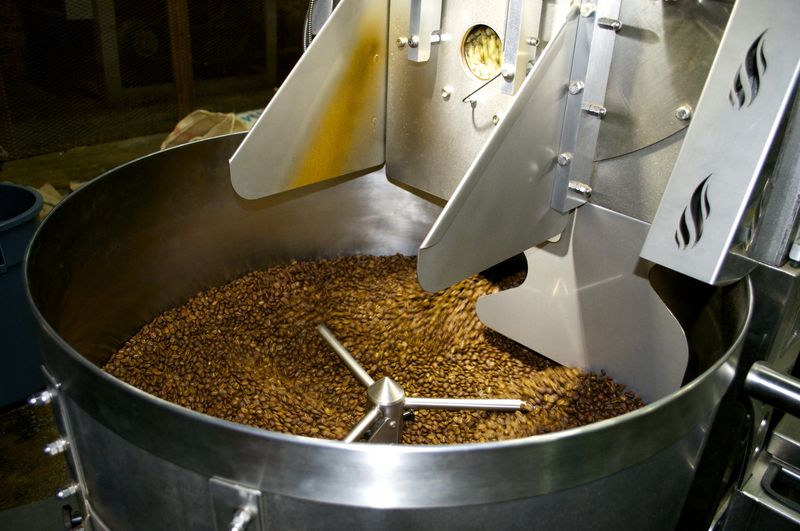Coffee Geekery 101: Meet The Pulley Collective

In Brooklyn's artisan-friendly Red Hook neighborhood, anyone can roast their own beans — thanks to the Pulley Collective.
Serious New York coffee bars like Joe the Art of Coffee and Ninth Street Espresso have long had the respect of the city's coffee geeks. Known for their impeccable brewing skills, they sourced their coffee from lauded craft roasters. But they didn't roast their own. Until now. Joe and Ninth Street are two of the highest profile clients of The Pulley Collective, a cooperative roastery based in the artisanal-edibles mecca that is the Brooklyn neighborhood of Red Hook. The Collective's neighbors include a craft whiskey distiller, chocolatier and an authentic Key lime pie baker. The roastery is open to any would-be roasters who want to rent it for half a day at a time.
Founder Steve Mierisch is from a coffee-growing family. He was driven by a desire to bridge the coffee farm-to-cup gap and also hoped to make his family's beans more available to small New York City roasters. The result is a space not only to make great coffee, but to form new ideas and relationships with like-minded folk. Early on, he hooked up with his friends from Joe the Art of Coffee, who had been looking for a way to get into the roasting game. Ed Kaufmann, the director of roasting for Joe, says he liked the idea of a communal space, like the one his band splits with four other bands in Williamsburg.
The Pulley Collective is located down a quaint cobblestone road right on the edge of the Red Hook waterfront. As you enter, the salty smell of sea air is quickly replaced by that of fresh roasted coffee. The warehouse is equipped with two roasters, including a 20-year-old Diedrich machine and a new larger Loring SmartRoast, which has been deemed the most energy-efficient roaster on the planet. Most roasters use an afterburner to eliminate the smoke caused by roasting. This step can use up to 400% more fuel than the roasting itself. If you're going to buy fair-trade, bird-friendly, sustainably farmed beans, why not roast them energy-efficiently?
On the day we visited, Joe the Art of Coffee roaster and barista Mike Morgenstern was cooking up a batch of espresso in the Loring. He used his lean tattooed arm to stir the beans in the drum, occasionally popping one into his mouth to see how the coffee was coming along. Kaufmann says the machine is able to roast about 2,000 pounds per 12-hour day; Joe is doing roughly 4,000 pounds of beans per week using the facility two-and-a-half days weekly. It's currently taking up the biggest chunk of the Collective's time. There are three other companies using the space at the moment.
In addition to a little cupping area and a weighing and bagging station, the Pulley Collective warehouse is piled high with large canvas bags of green coffee from just about every growing region you can think of, including Nicaragua and Honduras, where Mierisch's family owns coffee farms. We even spotted a bag with big red cherries on it: superstar grower Aida Batlle's own bean selections from El Salvador. The beans everyone at Joe is most excited about these days? A Colombian that, still green, smells of orange blossoms and dandelions.
"I don't think you could just plug anybody into this thing," says Kaufmann, a sweet-tempered Montana native who is also responsible for buying all the green coffee. "You definitely have to have the right group of people. Us and Ninth Street, we respect each other so much and are always very thankful that we're together at this place. And Steve [Mierisch] is just such a great guy. It would be different if it wasn't the right fit."
Check out these coffee stories on Food Republic:

